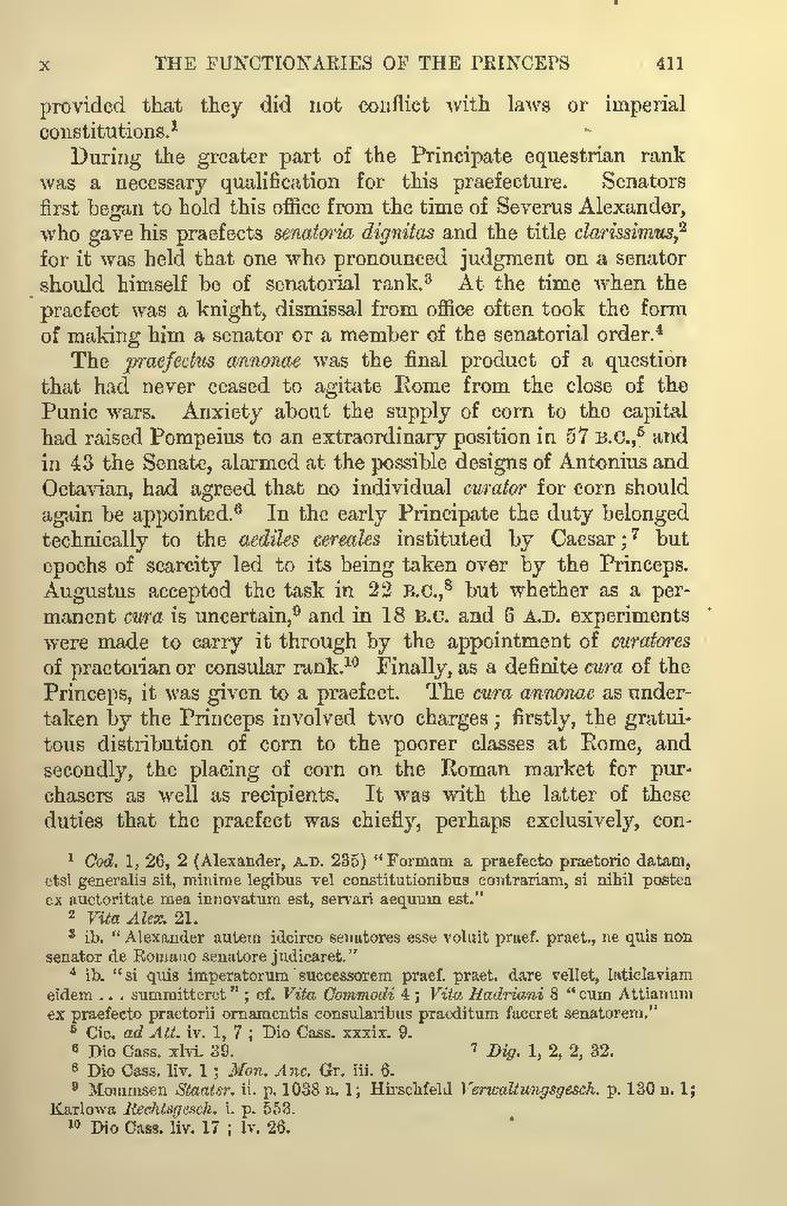provided that they did not conflict with laws or imperial constitutions.[1]
During the greater part of the Principate equestrian rank was a necessary qualification for this praefecture. Senators first began to hold this office from the time of Severus Alexander, who gave his praefects senatoria dignitas and the title clarissimus,[2] for it was held that one who pronounced judgment on a senator should himself be of senatorial rank.[3] At the time when the praefect was a knight, dismissal from office often took the form of making him a senator or a member of the senatorial order.[4]
The praefectus annonae was the final product of a question that had never ceased to agitate Rome from the close of the Punic wars. Anxiety about the supply of corn to the capital had raised Pompeius to an extraordinary position in 57 B.C.,[5] and in 43 the Senate, alarmed at the possible designs of Antonius and Octavian, had agreed that no individual curator for corn should again be appointed.[6] In the early Principate the duty belonged technically to the aediles cereales instituted by Caesar;[7] but epochs of scarcity led to its being taken over by the Princeps. Augustus accepted the task in 22 B.C.,[8] but whether as a permanent cura is uncertain,[9] and in 18 B.C. and 6 A.D. experiments were made to carry it through by the appointment of curatores of praetorian or consular rank.[10] Finally, as a definite cura of the Princeps, it was given to a praefect. The cura annonae as undertaken by the Princeps involved two charges; firstly, the gratuitous distribution of corn to the poorer classes at Rome, and secondly, the placing of corn on the Roman market for purchasers as well as recipients. It was with the latter of these duties that the praefect was chiefly, perhaps exclusively, con-*
- ↑ Cod. 1, 26, 2 (Alexander, A.D. 235) "Formam a praefecto praetorio datam, etsi generalis sit, minime legibus vel constitutionibus contrariam, si nihil postea ex auctoritate mea innovatum est, servari aequum est."
- ↑ Vita Alex. 21.
- ↑ ib. "Alexander autem idcirco senatores esse voluit praef. praet., ne quis non senator de Romano senatore judicaret."
- ↑ ib. "si quis imperatorum successorem praef. praet. dare vellet, laticlaviam eidem . . . summitteret"; cf. Vita Commodi 4; Vita Hadriani 8 "cum Attianum ex praefecto praetorii ornamentis consularibus praeditum faceret senatorem."
- ↑ Cic. ad Att. iv. 1, 7; Dio Cass. xxxix. 9.
- ↑ Dio Cass. xlvi. 39.
- ↑ Dig. 1, 2, 2, 32.
- ↑ Dio Cass. liv. 1; Mon. Anc. Gr. iii. 6.
- ↑ Mommsen Staatsr. ii. p. 1038 n. 1; Hirschfeld Verwaltungsgesch. p. 130 n. 1; Karlowa Rechtsgesch. i. p. 553.
